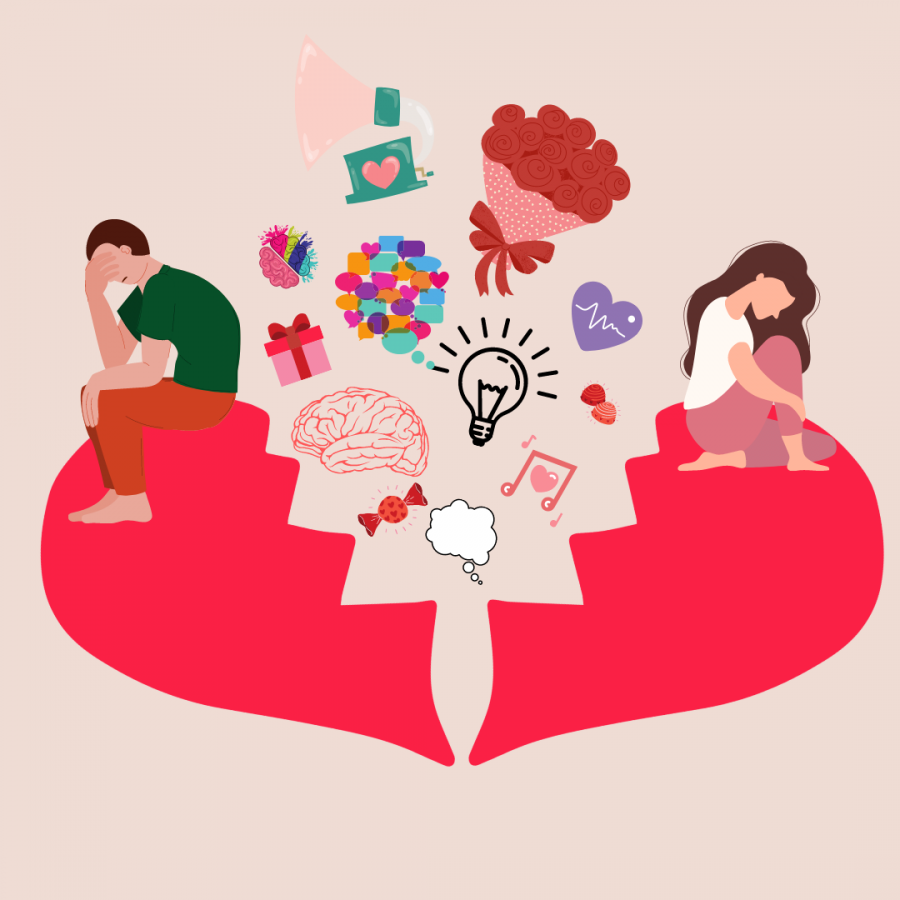The Headache Behind Heartbreak: Romantic Rejection and Teen Mental Health
A broken heart. In many lives, heartbreak can cause a major impact on our hearts and our social lives. While many may think heartbreak is temporary, it has been known to have scientific effects upon the body.
January 27, 2022
Everyone knows the famous scene from Star Wars: Revenge of The Sith when Padme Amidala, the mother of Luke and Leia, tragically died of a broken heart after her husband Anakin went to the Dark Side.
So is it possible to die of a broken heart, or is it just a theory?
As far as we know, this was just a plot twist to fit the movie franchise. In the real world, heartbreak may not be a killer; relationships end all the time as the result of personality differences, lack of time spent together, lack of positive interaction between partners, infidelity, and the toxicity of the relationship. The worst side-effect of a real-life breakup is depression, the most common mental illness in the world today. If you find yourself in this situation, it’s best to talk to a counselor or another mental health professional who can give you the tools to start the healing process.
Regardless of the severity of your reaction, everyone experiences heartbreak at some point. Read on for a breakdown of what typically leads to heartbreak, the science behind this ubiquitous experience, and most importantly, some tips and strategies to help you move on when you’re ready.
The Science Inside Our Minds
In 2005, a team of psychology researchers launched a study on love and rejection. One of their experiments involved showing individuals a picture of their loved one while scanning them by an fMRI machine. Scans depicting individuals’ brain chemistry revealed that the loved one’s image caused the individual’s caudate nucleus to flood with the neurotransmitter dopamine. Dopamine is sometimes called the “feel-good neurotransmitter,” because our body releases it when we engage in enjoyable activities.
In 2010, the same researchers who first employed fMRI technology to observe this phenomenon also scanned individuals who’d recently experienced a break-up. They found that these motivation centers in the brain still activated when shown a picture of the romantic partner who rejected them, suggesting the dopamine-flooding process was still functioning despite the break-up. These mixed signals can contribute to feelings of anxiety and depression.
In addition to this process confusing us neurochemically, it’s also worth nothing that when we go through heartbreak, our mind focuses on the best memories of the person, rather than how they actuall were. In the 2010 study, the individuals who’d just experienced a break-up all reported they still thought about their ex-partner 85 % of the time when they were awake. They also reported a lack of emotion control.
After this group was scanned by the fMRI machines, researchers prompted them to have a circle session where they could share their emotions and experiences. The outcome of the session were statements like “It hurts so much” and “I hate what [they] did to me.”
No matter the circumstances or the chemistry, heartbreak ends up hauling some of us into the deep end of the mental health struggle.
Romance and Teen Mental Health
It is especially common for teens to engage in shorter relationships compared to their adult counterparts. When these shorter relationships end, they are understandably upset and might experience many of these same reactions in the brain.
A recent study reported that 23% of Canadian teens from 15 to 18 years old have experienced a breakup at least once. Even though this is very common for teens, the mental health affects can be lingering and severe. For example, scientists studied two groups of teenagers who’d recently gone through a breakup; 40% of the group reportedly experienced clinical depression following a breakup, whereas another 12% reported they experienced “moderate to severe” depression.
Some symptoms of depression in teens include sleep deprivation, substance usage, and thoughts of self-harm. Eventually, all teenagers learn from their breakups and adapt, but when in the midst of heartbreak, the following tips can help to heal.
Tips to Heal
The key to healing a broken heart is to distract yourself. Below are some time-tested strategies to refocus your attention elsewhere:
- Read a book
- Watch a movie
- Hang out with friends
- Find a new hobby
- Laugh with family and friends
- Try something new
In conclusion, heartbreak isn’t new, it isn’t unique, and it isn’t going away anytime soon. At some point in our lives, we will all experience it, but understanding that it will pass in time can help ease the pain. The most important thing while dealing with it is to remember you will find love again.





